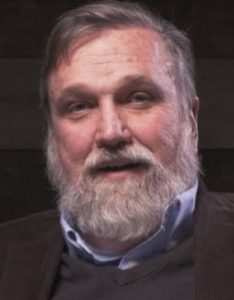When Donald Trump made his triumphal return to the White House, Joe Rigney could hardly contain his excitement. “The polls show that a significant majority of Americans favor the president’s goal,” the Baptist scholar noted, “but will we have the stomach for his means?”
Rigney worried that “image after image of tearful migrants being detained and removed from the country” might facilitate the “manipulation of our pity and empathy.”
Rigney once was a professor of systematic theology and New Testament at Bethlehem Seminary in Minneapolis. Bethlehem Seminary and College was founded by John Piper, until recently senior pastor of Bethlehem Baptist Church and a leading voice among
Baptist Neo-Calvinists.
Rigney’s war on empathy began shortly after George Floyd was murdered a few blocks from the campus of Bethlehem Seminary. Appearing on the first episode of Doug Wilson’s “Man Rampant” podcast, Rigney laid out the Christian case against empathy.
Wilson, pastor of Christ Church in Warsaw, Idaho, is famous for his defense of Southern slavery and opposition to women’s suffrage. Like Rigney, Wilson saw empathy as a damnable sin. Both men had been reading Edwin Friedman, a Reform rabbi and family theory psychologist who died in 1996.
Anxious families, Friedman believed, become enmeshed with the neediest family member. Any attempt to hold this person responsible for their self-destructive behavior will be quashed because anxious families value peace over integrity. This tendency to placate complainers and silence potential leaders, Friedman believed, also is prevalent in religious organizations, business enterprises and political life.
Unfortunately, Friedman used the term “empathy” to refer to this tendency to become entrapped within the worldview of weak and whiney people. Highly differentiated leaders who advocate for positive change and a clear vision can expect pushback, Rabbi Friedman counseled, but they must persevere.
A reaction to Black Lives Matter
In the years prior to Floyd’s murder, John Piper’s Minneapolis empire already was questioning its commitment to racial justice. In 2019, the congregation took the unprecedented step of asking Kyle Howard, an expert in racial trauma, to evaluate the congregation’s openness to racial diversity. But by the time Howard released his report, the Black Lives Matter movement had reached white heat in Minneapolis.
Some wanted Bethlehem Baptist Church to respond to Howard’s findings; others resented this sudden eruption of “wokeness.” In Rigney’s estimation, Black Lives Matter protesters, like gay rights and feminist activists, were weak and whining people who care nothing for divine truth. If empathy opens us to ungodly ways of looking at the world, our biblical convictions are in peril.
This point lies at the heart of Allie Beth Stuckey’s Toxic Empathy: How Progressives Exploit Christian Compassion. We can’t care about hurting people who live outside the borders of God’s family without damaging innocent people, she says. Care about pregnant women and you end up murdering babies. Care about mass incarceration and you forget about law and order. Care about asylum seekers and we forget about hardworking Americans who lose their jobs to immigrants.
Stuckey isn’t calling for a balanced, both-and approach; with her it is either-or. In her telling, faithful Christians must harden their hearts.
Rigney’s assault on empathy created so much backlash at Bethlehem Seminary that he eventually was forced to flee to Warsaw, Idaho, where he became part of Wilson’s bastion of Christian nationalist resistance.
Rigney’s new book, The Sin of Empathy: Compassion and Its Counterfeits, clearly was inspired by the trauma of the author’s painful encounter with fundamentalist Calvinists who sympathized with the BLM movement. Al Mohler, president of Louisville’s Southern Baptist Theological Seminary, loves the book so much, he booked Rigney on his own podcast.
Empathy as idolatry
For Doug Wilson, empathy is idolatry. In the podcast episode that launched the war on empathy, Wilson says, “Empathy is headlong, all-in. Whoever the victim is demanding the empathy, they’re like God, they will not share their glory with another, they demand everything from you.”
When believers feel the pain of unbelievers, Wilson, Rigney and Stuckey believe, the line between the believer and the unbeliever, the saved and the lost, the godly and the ungodly, begins to blur.
This way of thinking would have horrified Friedman, a Reform rabbi who was attracted to process theology, supported the Civil Rights Movement and distrusted authoritarians.
The secular assault on empathy
As Elon Musk recently has demonstrated, you don’t have to be a Christian nationalist to feel threatened by empathy.
“We’ve got civilizational suicidal empathy going on,” Musk recently informed an enthralled
Joe Rogan. “The fundamental weakness of Western civilization is empathy. They’re exploiting a bug in Western civilization, which is the empathy response.”
Musk’s take on empathy was inspired by Gad Saad, a Canadian evolutionary psychologist who currently teaches marketing. A frequent guest on the “Joe Rogan Experience,” Saad is an atheist dedicated to Darwinian analysis.
We are empathetic, Saad asserts, because group solidarity requires a measure of mutual concern. But when empathy is extended to people outside one’s tribe, the group becomes vulnerable to its natural enemies. When Americans identify more with foreign asylum seekers than with military veterans, the nation is placed at risk.
Saad blames this on the post-modernism, feminism and moral relativism that control the American academy.
Saad believes this even thought his own family came to Canada as asylum seekers fleeing religious persecution in Lebanon. He regards Canada as a failed state awash in wokeness and claims he would settle in Florida permanently if it didn’t mean losing tenure at Concordia University in Montreal.
Growing up with apartheid
Like Saad, Musk emigrated to Canada for undergraduate study before taking up residence in the United States.
Walter Isaacson’s Elon Musk is a 600-page meditation on the historical and psychological roots of Musk’s inability to empathize. Isaacson wonders if Musk’s remarkable achievements would have been possible if he had been more able to empathize with his employees and business partners? We never get a clear answer.
Musk has long claimed to suffer from “Asperger’s Syndrome” and, although Asperger’s was dropped from the therapeutic lexicon decades ago, he is clearly on the autistic spectrum. Isaacson also ties Musk’s empathy deficit to a sadistic father who, Elon says, viciously berated him for hours for the smallest misdeeds.
Musk says he attended South African Veldskool camps, “a paramilitary Lord of the Flies” in which boys were encouraged to fight and to steal rations from one another. The accuracy of Musk’s account is in dispute, but Veldskool camps were ubiquitous in South Africa, and they were designed to prepare pampered school children for the rigors of military service. For wealthy white parents raising children in apartheid South Africa, empathy was inconvenient at best.
An old family tradition
Musk avoided South Africa’s universal military conscription by emigrating to Canada for undergraduate study. His maternal grandfather, Joshua Haldeman, came of age in depression-era Saskatchewan. Like Elon Musk, Haldeman was a thrill-seeker with a pronounced authoritarian streak.
As a young man, Haldeman fell under the spell of Howard Scott, founder of Technocracy Inc. Scott believed politicians and businessmen should be replaced by scientists and engineers. A new “technate” stretching from Mexico to Greenland would replace the sovereign nations of Mexico, Canada and the United States (sound familiar?)
When the Canadian government picked up on the subversive implications of Scott’s plans, Technocracy Inc. was outlawed and Haldeman served two months in prison. Back in the free world, Haldeman embraced the most antisemitic faction of the Canadian Social Credit Party. After several unsuccessful attempts to win elected office, Haldeman was inspired by the imposition of apartheid rule in South Africa.
Us-them, win-lose thinking
Like his grandfather, Musk has learned to transform his inability to empathize into a virtue. In this he is not alone. The MAGA revolution sees the concept of pluralistic democracy as weak and unworkable. If America is to win, the BLM activists, the feminists, the illegal immigrants and the gay rights advocates have got to lose. When politics becomes a win-lose game, there can be no place for empathy.
“When politics becomes a win-lose game, there can be no place for empathy.”
Christian nationalists like Rigney and Wilson believe a hierarchical society dominated by white Christian heterosexual males reflects the will of God for creation. Atheists like Saad and Musk view a hierarchical world dominated by straight white Christian males as an evolutionary necessity.
Saad and Musk are atheists who reject the metaphysical underpinnings of Christianity in every particular. But religions have evolved as a mechanism for in-group solidarity. And since Christianity has been a unifying force in Western European civilization, it must be affirmed.
In essence, people like Musk and Saad view Christianity as a nonsensical necessity. Objective truth doesn’t matter that much when the fate of white Christian civilization is at stake. So long as Trump is protecting Fortress America from feminists, immigrants, people of color and the LGBTQ community, he is on the right side of history. If a statement works to the advantage of straight white Christian men, it’s pragmatically true.
On the flip side, any statement, however well-documented, that undermines white Christian male hegemony is pragmatically false. Language is utilized to achieve results, not to reflect objective truth.
The role of patriarchy and cash
A Calvinist like Wilson and an evolutionary psychologist like Saad are equally convinced that men and women are fundamentally and radically different in emotional temperament and must therefore play very different social roles.
Men were created (or evolved) to lead; women were created (or evolved) to nurture. America stands at the pinnacle of the white Christian European order, but our recent embrace of pluralistic democracy, Critical Race Theory and DEI programs threatens to end our prominence.
Elon Musk can abuse his employees because, without him, Tesla and SpaceX wouldn’t exist. Similarly, because heterosexual white Christian males fashioned American greatness, they have the right to abuse the weak and the woke.
“When the strong aren’t allowed to rise to the top, the thinking goes, society is enfeebled.”
When the strong aren’t allowed to rise to the top, the thinking goes, society is enfeebled.
It is hardly surprising that the war on empathy is bankrolled by the wealthy. A political philosophy that celebrates the strengthening of traditional hierarchy is a boon for people living in the upper echelon of the moneyed class.
The top seven contributors to political candidates in the 2024 election cycle all placed their money on MAGA. And, as Kathrine Stewart documents in Money, Lies, and God: Inside the Movement to Destroy American Democracy, the war on empathy is exceptionally well-funded because it appeals to the super-rich.
Empathy in Christian context
Empathy isn’t an emotion, it’s an orientation. People in the helping professions are taught to avoid saying, “I know how you are feeling” because we never do. We can’t. How you are feeling is a complete mystery to me.
But that doesn’t mean you don’t matter to me. Empathy says, “You matter.” Black lives matter. Women matter. Children matter. Babies matter. The elderly matter. Poor people matter. People living with mental illness matter. Illiterate people matter. Conservatives and liberals matter. We all matter.
If we follow Jesus, even our enemies must matter to us because they matter to God. You may not understand me, and I may not understand you, but we are wonderfully tangled in an interdependent web. We need one another. We love one another. We value one another.
If empathy is the glue binding our society together, we will have a beef with hierarchy. If the maintenance of hierarchy is our primary concern, we will have a beef with empathy. Which will it be?
Alan Bean leads Friends of Justice based in Fort Worth, Texas, where he is a member of Broadway Baptist Church.
Related articles:
Why empathy is under assault today | Opinion by Rodney Kennedy
Have you heard the one about empathy being a sin?
The recovery of empathy | Opinion by Stephen Shoemaker
This post was originally published on here












